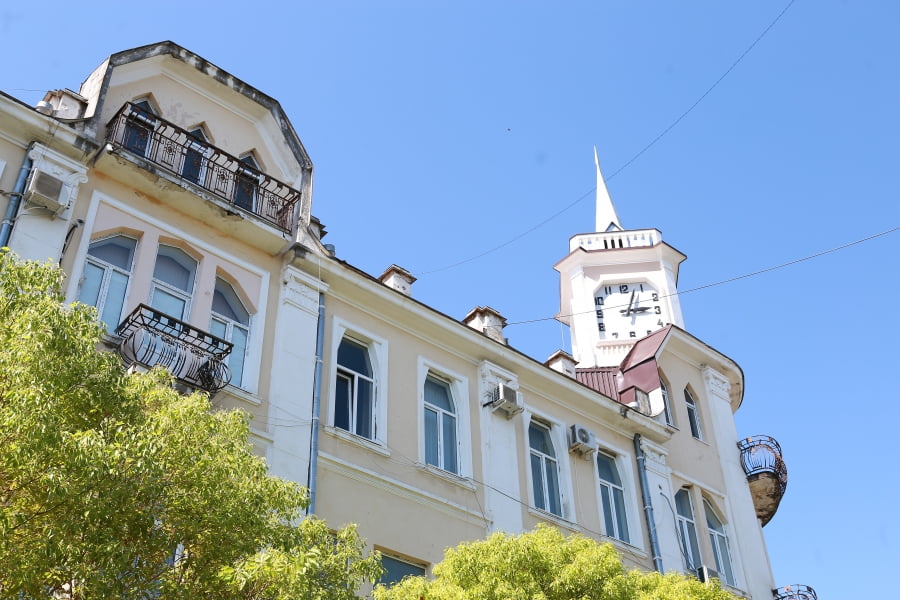Russian MP Leonid Kalashnikov, chairperson of the State Duma Committee on CIS Affairs, Eurasian Integration and Relations with Compatriots, has stirred controversy in Sokhumi after voicing concern over Abkhaz legislation making the knowledge of the Abkhaz language compulsory for lawmakers.
Russian Interfax agency cited MP Kalashnikov as saying on May 25 that the legislation, “pro-forma aimed at supporting the Abkhaz language,” in fact leads to “discrimination of the Russian language” in the occupied region.
“Such initiative could result in inter-ethnic tensions considering the status of the Russian language, which is the de facto means of inter-ethnic relations,” the lawmaker warned in an expanded Committee meeting with Abkhaz chief diplomat Inal Ardzinba in attendance.
Pointing at Ukraine, the Russian MP reportedly claimed that “such superficial approach in this sector” could aggravate the situation in the occupied region.
Besides, the Russian state-controlled TASS agency reported that MP Kalashnikov pushed Sokhumi to speed up the implementation of its “common socio-economic space” deal with Moscow through harmonizing Abkhaz legislation with that of Russia, particularly by introducing the law on foreign agents — fiercely resisted by local civil society leaders.
He also reportedly announced that Moscow and Sokhumi had agreed to set up a working group to focus on abolishing the Psou checkpoint, located on the Abkhaz-controlled sector of Georgia’s border with Russia, in the northwesternmost part of the region.
Abkhaz Chief Diplomat Responds
Inal Ardzinba responded to MP Kalashnikov’s claims on May 25 in a statement stressing that existing Abkhaz legislation “reliably protects the status of the Russian language, allows all citizens to use the Russian language as much as possible and without hindrance in all spheres of activity.”
He pointed out that as per the occupied region’s “constitution,” both Abkhaz and the Russian are considered “languages of state and other institutions.”
Ardzinba also pointed out that all Abkhazia residents are “guaranteed education and training in the Abkhaz and Russian languages.”
He also asserted that Russian serves along with the Abkhaz language as a “means of official communication in the highest bodies of state power,” all the while draft laws and other legal acts are all submitted in both languages.
Russian Community in Abkhazia Deny “Any Infringement”
In a joint statement on May 26, Abkhazia-based nonprofits, including the Russian Community of Abkhazia and the Black Sea Cossack Army of Abkhazia, stressed that in the region the Russian language “is not subject to any infringement and there are no threats of its disappearance.”
The signatories dubbed MP Kalashnikov’s remarks “as unacceptable and unfriendly attacks on the entire multinational people of Abkhazia,” which is aimed at creating interethnic tension.
“This misunderstanding of our compatriot in the State Duma of the Russian Federation will not become a point of national tension within the society in Abkhazia and between our fraternal countries,” the groups said.
The signatories expressed their confidence however that in the future Abkhaz laws will introduce a mandatory quota of several ethnic Russian lawmakers in its legislature, “who will be able to represent the interests of the 22,000 [members] of the Russian community in Abkhazia.”
Abkhaz Opposition Slams MP Kalashnikov Over “Outrageous” Remarks
RFE/RL’s Russian-language service Ekho Kavkaza cited on May 27 Abkhaz opposition leader Adgur Ardzinba as saying that MP Kalashnikov’s statement was “outrageous.”
Ardzinba stressed that adopting the legislation was necessary as the Abkhaz language “is under threat” and lambasted the Abkhaz delegation at the Committee meeting for not telling MP Kalashnikov “how things really are.”
He slammed the authorities for sending “wrong signals” and “trading on our national interests.”
The opposition leader also pointed out that the issue of the Russian language in Abkhazia should not have been discussed at the meeting at all, arguing it was supposed to only be concerning the Psou Checkpoint and that “such questions of the agenda are discussed in advance.”
The previous convocation of the Abkhaz legislature adopted changes to the law on electing deputies to the “parliament” on March 21, making it compulsory for lawmakers to know both Abkhaz and Russian languages.
The changes are set to take force in 2027, meaning the amendments will apply to the next convocation of the legislature, as reported by Sokhumi-based Apsnypress.
This post is also available in: ქართული (Georgian) Русский (Russian)

